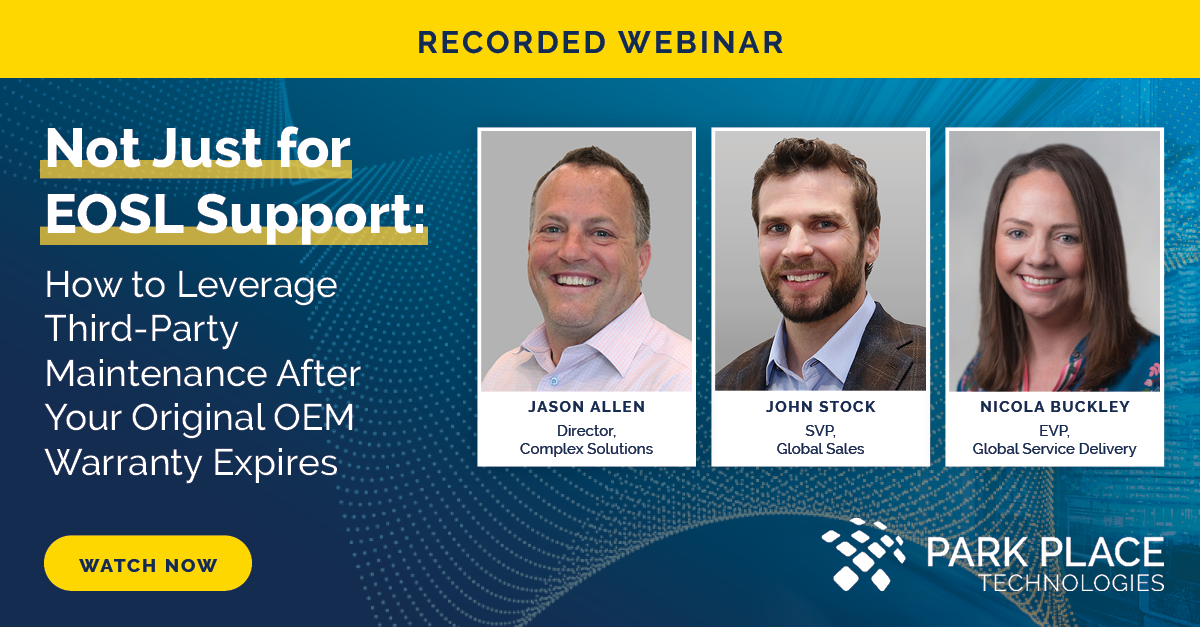8 Things to Consider When Purchasing a Server
Park Place Hardware Maintenance
Helpful tips on buying server equipment in the data center
IT hardware and servers continue to remain an integral part of a business’ IT infrastructure. Servers play an important part in helping your business stay organized and efficient, and there are a wide range of highly configurable servers available. Determining which server is the right server for your business needs can be challenging. To help you evaluate and carefully consider your options and choose the best server solution, here are eight things to think about before making your purchase:
1. Business IT Requirements
It’s important to think about the long-term business plan. A particular server you may have in mind might meet your immediate business needs, but will it be able to efficiently and cost-effectively support and run various files, applications, and data as your business evolves, develops, and grows?
2. Accessibility
Ensuring that your server can support easy access for all users, even those users who work remotely or may be working in the field, can make your business more efficient. If you are purchasing a new server to work alongside some older hardware, the new server may be able to provide this capability across all of your applications.
3. Buying or Leasing
Do you want to buy a server outright or lease it? There are many flexible, pricing models on the market so ensure you get the flexibility and billing options that suit your business needs.
4. Initial vs. Ongoing Costs
If your business requirements are relatively simple, then a ‘low-end’ server should suit your needs, however, cheaper servers are not always scalable as they usually have one drive – limiting total storage capacity and fault tolerance capabilities.
The up-front cost of buying a server can be just the tip of the iceberg when it comes to the overall cost of getting the server up and running, configured and integrated into the wider IT infrastructure of your business, and then keeping it reliable, secure and up-to-date. While initial price is important, consider the full cost of maintaining and supporting the server throughout its lifecycle.
5. Server Lifecycle
Your server can last for as long as you want to keep the hardware. End of Service Life (EOSL) will not be a concern as Park Place Technologies is able to support for server equipment as long as you wish to keep your server.
6. Resources
If you do not have the necessary skilled IT resources in-house, outsourcing your IT support to a specialist third-party support company like Park Place who can provide the specialist expertise and professional services that your organization may require over a period of time.
7. Resiliency & Redundancy
Finding a solution that offers resilience and redundancy at the right cost and protecting your complete server estate is a challenge. Make sure you know what security is included with your server and how it will be kept up-to-date. If your business cannot tolerate server downtime, you may wish to consider running a parallel system to provide data redundancy and protect you in the event of business interruption. Additionally, ensure that with your new server, all backup and disaster recovery options are covered.
8. Can hybrid IT benefit your organisation?
With hybrid IT, you choose which data and applications you keep on your local server, and which you can virtualize. This can give you the best of both worlds with the flexibility and cost-effectiveness of virtualization and the control and data protection of on-site IT.
Whether you choose a traditional, on-premise server, or a virtualized hybrid IT solution, buying a new server provides an opportunity to address current and future concerns that could lead to greater operational efficiency and even cost savings. When your server does go end of life, remember that Park Place Technologies can help extend its life for as long as you need it. For more information, contact us today.



